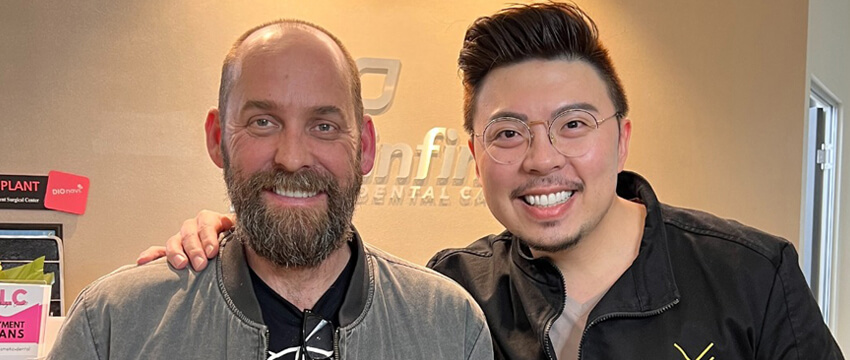When it comes to improving your smile, dental implants are one of several different options available to you to replace damaged or missing teeth. They are a permanent solution and can give you the confidence to smile again. However, implants are a multi-stage process, so find out about dental implants (before and after surgery) before you see a dentist that offers free consultation appointments for further advice.
What are dental implants?
A dental implant is a replacement tooth root, typically made from titanium. It is embedded into the jawbone in a surgical procedure. After several months, the implant and jawbone fuse in a process called osseointegration. This provides a strong and secure base to attach a crown (artificial tooth), which completes the procedure.
Why choose dental implants?
There are many reasons to choose dental implants over other tooth replacement options.

But, if you choose dental implants, it’s worth knowing about the process.
The procedure is not completed in one or two sessions but takes several months (and sometimes longer) from the initial consultation to the implant surgery and, finally, the attachment of the artificial crown. So, let’s look closely at the dental implants process before and after surgery.
Dental Implants Before Surgery
Before you can even be considered for a dental implant, a thorough assessment and careful planning are required. Dental implants have a high success rate, and this is due to the careful evaluation of each patient, as well as the diligent preparation of the procedure.
Initial Consultation and Assessment
The initial consultation and assessment for a dental implant is a vital step to ensure that the surgery is right for you. It can take between one and two hours to complete. During this consultation, your oral surgeon will review your medical history and current oral health status.
A thorough examination of your mouth, teeth, and gums will determine if you are a candidate for dental implants. X-rays and CT scans may also be taken to better look at your jawbone. Suppose the dentist determines you are a good candidate for a dental implant. In that case, the next step will be to take impressions of your teeth (required to make a temporary crown after the implant is placed, as well as your permanent artificial tooth) and develop a treatment plan.
The treatment plan will outline all your dentist’s findings, the treatment goals, type of implants, where they will be placed, the timetable for each part of the process, provisions for temporary teeth (e.g. dentures), and costs. It is a crucial part of the dental implants before and after process that ensures only suitable candidates are put forward for the procedure who are likely to have a successful outcome. You should get a free consultation at your local dental clinic to learn more about your suitability.
If you have any dental health issues, such as tooth decay or signs of active gum disease, the dentist will want to ensure these are cleared up before any dental implant treatment starts. This will be included in your treatment plan.
Some people are not deemed suitable for a dental implant right away, for example, anyone with bone loss in the jawbone at the site where the implant needs to be placed. However, there is an option of having a dental bone graft to augment the bone, making it suitable for an implant. This will add additional time to the implant procedure of several months while the graft stimulates new cell growth.
Dental Implant Surgery
Dental implant surgery is performed at the dental clinic. It is typically carried out with a local anaesthetic, although if you are nervous, conscious sedation is an option that can be given in addition to the anaesthetic. The procedure takes between one and two hours per implant.
The implant is inserted into the jawbone below the gum line during the surgery. It is left to heal for around four to six months, during which osseointegration occurs.
Dental Implants After Surgery
Healing
- After dental implant surgery, you are likely to experience some discomfort, although pain should be well-controlled with medication given to you by the dentist.
- You will need to modify your diet for several days or longer—consuming soft food that doesn’t require chewing, such as mashed potato, yoghurt, soup, scrambled eggs etc. Be careful not to dislodge any blood clot that may have formed over the incision site, as this helps to keep infections out. Avoid brushing around the area with your toothbrush, but gently gargle with salt water. Gradually start to introduce everyday foods into your diet as your mouth begins to heal.
- Swelling may occur and is at its peak around three days after surgery. Placing ice packs over your face above the incision site can help to reduce swelling. You may want to consider getting gel masks as these can keep your hands free.
- You may get bruising on your face, which should start to subside after a few days, but could take a couple of weeks to disappear entirely.
Attachment of Artificial Tooth
The last part of a dental implant procedure is the attachment of an artificial tooth (crown). This takes around an hour at your dentist’s office, is carried out with a local anaesthetic and is typically completed four months after the implant surgery to complete the process.
The Takeaway
Now you know what’s involved in the dental implants before and after process. If you have missing teeth, get in touch with us on (02) 9159 6237 for a free consultation near you to supercharge your smile.
Note: Any surgical or invasive procedure carries risks. Before proceeding, you should seek a second opinion from an appropriately qualified health practitioner.
References
Colgate: Bone resorption: why it happens and what to do next
https://www.colgate.com/en-us/oral-health/mouth-and-teeth-anatomy/bone-resorption-why-it-happens-and-what-to-do-next
Healthline: What you need to know about a dental bone graft
https://www.healthline.com/health/dental-bone-graft
WebMD: Sedation dentistry: can you really relax in the dentist’s chair?
https://www.webmd.com/oral-health/sedation-dentistry-can-you-really-relax-in-the-dentists-chair


